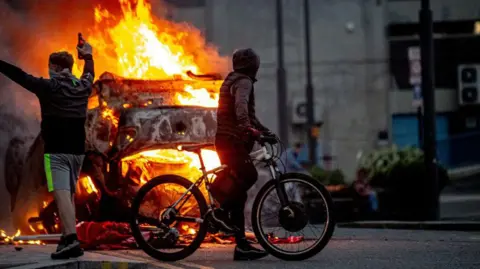 Getty Pictures
Getty PicturesThere was a “clear connection” between the violent dysfunction in England and Northern Eire in the summertime and posts on social media and messaging apps, Ofcom has concluded.
The federal government had requested the media regulator to think about how unlawful content material and disinformation unfold throughout the unrest.
In an open letter setting out its findings, Ofcom boss Dame Melanie Dawes stated such content material unfold “extensively and shortly” on-line following the stabbings in Southport, in July, which preceded the dysfunction.
She added most on-line companies took “fast motion”, however stated the responses of some corporations have been “uneven”.
“Misinformation appeared on-line nearly instantly after the assaults, a few of it showing to have malicious intent and searching for to affect public opinion and response,” Dame Melanie wrote.
“Posts in regards to the Southport incident and subsequent occasions from high-profile accounts reached tens of millions of customers, demonstrating the position that virality and algorithmic suggestions can play in driving divisive narratives in a disaster interval,” she added.
Enhanced powers
On the time of the unrest, Ofcom confronted criticism for not doing extra to rein within the unfold of unfaithful and inflammatory content material.
It urged tech firms to take action – but in addition identified the improved powers it is because of get below the On-line Security Act had not but come into drive.
The act will see the creation of codes of apply for giant tech corporations which is able to place new tasks on them for tackling disinformation.
“I’m assured that, had the draft Codes been in drive on the time, they’d have offered a agency foundation for pressing engagement with companies on the steps they have been taking to guard UK customers from hurt,” Dame Melanie wrote.
She stated the brand new powers set “clear requirements” for what Ofcom would anticipate to see in future from huge tech corporations, resembling:
- Specifying of their phrases of service provisions how people are to be shielded from precedence unlawful content material
- Having techniques designed to swiftly take down unlawful content material and having “adequately resourced” content material moderation groups
- Offering efficient and accessible mechanisms for customers to complain about unlawful content material, together with on messaging platforms
The unrest which broke out in August 2024 was the worst that had been seen within the UK for a decade.
It was adopted by waves of arrests and prosecutions, some for on-line offences.
The position that huge tech performed was topic to a lot scrutiny – although the platforms themselves remained largely silent.
The prime minister additionally obtained dragged right into a confrontation with one of many highest profile individuals in tech – X proprietor Elon Musk.
The tech billionaire instructed that “civil conflict is inevitable” following the dysfunction.
Sir Keir Starmer hit again saying there was “no justification” for Mr Musk’s feedback, including there was extra that social media corporations “can and must be doing”.
